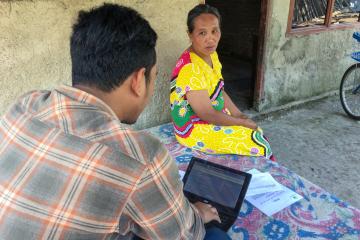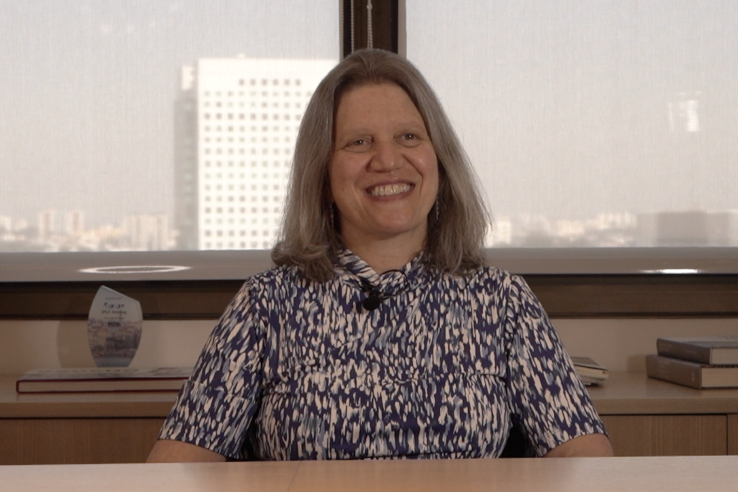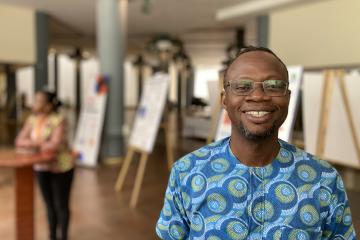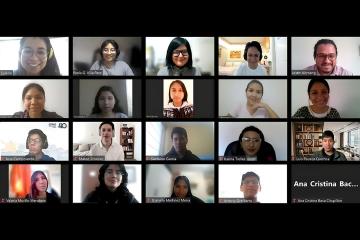
20 for 20: Vivianne Naigeborin on the evolution of JOI Brazil and promoting productive inclusion

This is the fifth post of J-PAL’s 20 for 20: Partner Voices blog series, where we showcase stories of results and impact with our partners to celebrate our twentieth anniversary. Read on to learn more about Vivianne Naigeborin, Executive Director of the Arymax Foundation, and her experience collaborating with J-PAL Latin America and the Caribbean (LAC) through the Jobs and Opportunity Initiative (JOI) Brazil.
As J-PAL marks its milestone 20th anniversary, J-PAL LAC’s JOI Brazil initiative also starts its third year of generating robust evidence on policies that address pressing Brazilian labor market challenges. This occasion provided the perfect opportunity for us to talk to Vivianne Naigeborin, the Executive Director at Arymax Foundation.
With a rich history in social innovation, Arymax is a Brazilian Family Foundation dedicated to supporting evidence-based initiatives focused on productive inclusion—which can be defined as providing people facing economic vulnerability with access to the labor market—to meet societal needs and reduce poverty. To achieve this, they have been an integral part of JOI Brazil's journey since its creation in 2021.
We sat down with Vivianne to discuss how Arymax and other donors (B3 Social, Fundação Tide Setubal, Potencia Ventures, IDB, and Insper) made JOI Brazil possible. Vivianne has been instrumental in not only bringing in additional partners to the initiative but also in promoting a culture of evidence-based decision-making around productive inclusion policies in Brazil. In this interview, she shares her insights on JOI Brazil and how this initiative is shaping the future for workers in the country.
Could you tell us a bit about Arymax's collaboration with J-PAL and its role in JOI Brazil?
We first approached J-PAL in 2019, during a moment in which Arymax was repositioning itself. Through this rebranding, we opted to champion productive inclusion and held a series of fruitful conversations with J-PAL. Once we identified this shared vision, we received an invitation to spearhead J-PAL's first initiative in the Brazilian territory, JOI Brazil. We mobilized other partners - including INSPER, IDB, Potência Ventures, B3, and Tide Social Foundation—and together founded JOI Brazil.
Given that 2023 marks J-PAL's 20th anniversary, how do you think JOI Brazil’s work aligns with Arymax's mission?
We believe that productive inclusion is one of the most efficient strategies in combating poverty since it enables people to access job training and to adequately prepare for, enter, and sustain employment. As a result, they can generate their own income, thus gaining autonomy and choice.
The issue is that the labor market situation in Brazil is so complex that we cannot afford to make mistakes. This is precisely why organizations like J-PAL with JOI Brazil are critical. They provide us with access to evidence, fostering a data-driven culture. This is crucial in guiding us to the best strategies for promoting productive inclusion, which Brazil urgently needs.
In your opinion, what are the most significant milestones or achievements of Arymax, J-PAL, and JOI Brazil’s collaboration?
We've already achieved numerous milestones, and we're not even halfway through the program yet. There are still many challenges ahead. But to celebrate what we've accomplished so far, I think the first major milestone is our contribution to strengthening the culture of monitoring and evaluation in Brazil. We have supported the generation and use of evidence through various workshops, lectures, and training sessions for both public and private institutions. We also have projects with Brazil's Sistema S—a joint group of organizations and entities dedicated to professional training, social assistance, consulting, research, and technical assistance—and various productive inclusion initiatives. Currently, JOI Brazil has partnerships with 37 public and private sector initiatives focused on productive inclusion. We are helping decision-makers at these institutions create a permanent culture of evaluation and evidence production.
Another significant achievement worth celebrating is the research funding opportunities that have been issued since the program's inception. Through these funding opportunities, JOI Brazil has selected thirteen projects for evaluation in seven Brazilian states. Seven of these projects have the potential to become full randomized evaluations. All of them focus on highly relevant topics such as workplace safety, discrimination in the job market, the inclusion of women in the workforce, technical and vocational education, and other pressing issues in the current debate on the future of work.
What advice would you give to other organizations or individuals looking to engage in partnerships with J-PAL and JOI Brazil? Is there anything else you'd like to share about your experience with JOI Brazil or evidence-based policies in general?
Brazil is at a pivotal moment in its societal development. The country is experiencing the final phase of a demographic bonus, a period when the proportion of the working-age people is larger than the rest of the population. There is a large contingent of young people currently out of jobs but eager to work and in need of opportunities for a better future. Moreover, two significant groups in Brazilian society—women and the Black population—are still underrepresented in the job market, especially in formal employment. We also have an aging population in their 40s, 50s, and beyond who will be prematurely excluded from the market if they don't have access to skill and talent renewal, thereby compromising the country's productivity.
Given all this, it's a privilege for us in Brazil to count on J-PAL's presence. My advice to both public and private policymakers is to seize this privilege. JOI Brazil is open to all institutions that want to improve their initiatives for productive inclusion. Reach out to JOI Brazil. Take advantage of this global institution that monitors labor market challenges worldwide and has an evidence bank being enriched with data produced directly in Brazil. This is the time for us to act effectively and with more certainty about the results we will achieve.



